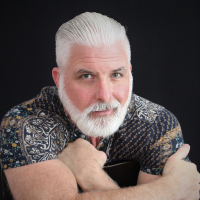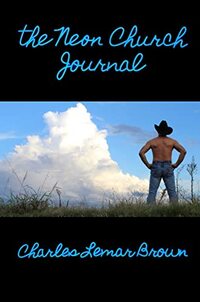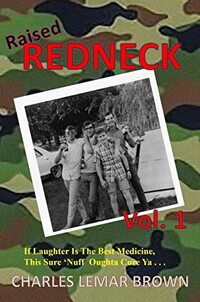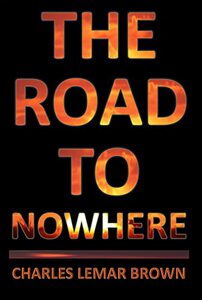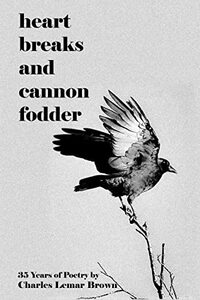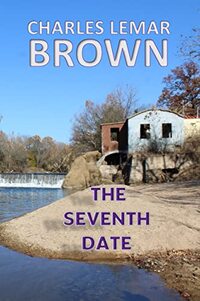Charles Lemar Interview Published on: 04, May 2023
 Where were you born, and what was your childhood like?
Where were you born, and what was your childhood like?
I was born in Ada, Oklahoma and grew up both very poor and extremely rich. Poor financial, although I did not know it until I was much older. By the time I was five, I had two sisters, and my parents were doing the best they could to raise the three of us on a teacher’s salary. By the time I was twelve, our little family had moved a total of twenty-one times to three different states, finally settling in Davis, Oklahoma where my parents still live today. Extremely rich, because as children, my sisters and I, were blessed with everything a child needs, two loving parents, a roof over our heads, and food in our bellies. I could not have asked for a better childhood.
When did you first realize you wanted to be a writer?Growing up we did not have a television in our home, so reading was my main form of entertainment. In those years, my dad, Charles C. Brown, from time to time would pen a poem and share it with us, so it just seemed natural to me that someday I too would write poetry, but the first time I remember considering writing a novel was when my mother, Carolyn Brown, allowed me to read her first manuscript. I had been out of school for several days due to sickness and had read everything in the house that interested me. One morning I began to whine that I had nothing to do and nothing to read, Mom brought in a binder and said here read this. It was called “Trampson” and I finished it by that evening. Subconsciously, I think that was the day I started thinking about writing a book myself.
What inspired your first original story? Did you share the tale with anyone?My first original story was an assignment in a high school creative writing class. It was a short story based on my pet parakeet, Perd. It was published in our yearly anthology. Somewhere along life’s journey my copy was lost, and I do not recall the particulars of the story.
How has the journey been as a high school science teacher?I actually began my teaching career in middle school science before moving to high school and the journey was fantastic right up until Covid. I taught lab-heavy hands-on science courses, Biology, Botany, Zoology, Microbiology, and Human Anatomy & Physiology. In the year following the pandemic, everything shifted to a more online computer-based model, and I found it hard to teach in the style I to which had become accustom. I remained one additional year in hopes that the shift was temporary but when it became apparent that education had changed permanently, I retired. Overall, I would have to say my teaching journey was a good one. I thoroughly enjoyed it and was in a position to leave on my own terms, so I never came to dislike what I was doing. It is always good to be able to leave a job feeling like you have made a difference if it was only for a little while.
Being a science teacher, did you ever think about writing a sci-fi novel? Why or why not?The first novel I ever began writing was a fantasy, the kind with halflings, dwarves, and elves. I was a senior in high school and if I remember right, I managed three chapters. I do not recall why I did not continue writing it. Sci-fi means different things to different folks. To me it means Star Trek and Star Wars and no I never thought about writing anything along those lines. I have toyed with the idea of writing a three book fictional series based around DNA, but only time will tell if or when I might get to it. Let’s just say, it’s on the back burner for the moment.
How did you grow emotionally and mentally while working with children teaching science?I would say the biggest area of growth for me in both the emotional and mental areas while teaching was patience. If you do not have patience going into teaching, you will have at least a little when you finish. At least that was my experience. As a father of seven, I thought I knew a lot about kids. Each year, I would be introduced to between eighty and a hundred and twenty new students and if you do not think we all have our own little quirks and idiosyncrasies, you have never taught school. To deal with so many individuals, one must learn patience.
How many cats do you have?One. Tilee is an only cat and extremely proud of it. She is not fond of other animals although she tolerates my son’s dog, Winston, and his fiancé’s cat, Leon, when they are at the house.
Why would you recommend readers to read your novel, Raised Redneck?Three reasons. One, if you were raised country, backwoods, hillbilly, or redneck, you will find something within these humorous short stories to which you can relate. Two, if you were not raised in such a manner, it will be very educational. And three, no matter how you were raised, it’s gonna make you laugh, and laughter is awesome medicine for the soul.
How did you come up with the idea for your book, The Road to Nowhere?One of my duties as an employee of Carolyn Brown Books, Inc. is to drive my mother and father to book conferences, vacations, and research trips. One spring break week, we took a research trip to southwest Texas. Before we left, I tried to get my youngest son who was having some relationship issues to accompany us. I thought getting him out of town for a little while might help clear his mind. He refused and stayed home. Two days into the trip, I called him late in the evening. The relationship had taken a turn for the worse and although he still thought he could make it work, he was alone and very unhappy. After we hung up, I got ready for bed, but was unable to fall asleep. In frustration, I got up, used the little notepad the motel left on the bedside table, and to pass the time, I outlined The Road To Nowhere.
What is the significance of writing the book, The Neon Church Journal?Therapy. A lot of what I write, whether it be poetry, humorous short stories, or novels, comes from a place of therapy. Some folks jog. Some folks meditate. I write. In the beginning I wasn’t sure if I would ever share this book. It was the first novel I managed to complete but the third one that was published. The few who read the manuscript in the years after it was finished convinced me that it might be of help to some who might be struggling in relationships. So, in short, the significance of The Neon Church Journal is that it is a fictional story which deals with a very real-world problem, domestic abuse. And in the end, I decided to publish it in hopes that it might help those who have been, will be, or are still living in its destructive cycle.
If you were asked to ghostwrite a novel, what would your reasons be to accept or reject?If asked to ghostwrite a novel, I would have to respectfully decline the offer. Not because I have anything against it, but for two reasons. First, I do not feel that at this time, I have an adequate knowledge of what it takes to help someone else write a novel. And second, because most of what I write comes from the squirrels that run around in my own head and I’m not sure how well my little critters would feel about having someone else’s come to visit.
Writing can be an emotionally draining and stressful pursuit. Any tips for aspiring writers?Set goals you can obtain and do not push yourself past the point of enjoyment. Life is too short not to enjoy what you are doing. And no matter what you are doing, there can and will come a point in time where it becomes stressful if you let it. I’ve only been writing novels for a few years and there have already been a couple of times when I have pushed myself too hard. When I find myself in these positions, I back up, reevaluate, and adjust my goals if need be.
Which is the next book you are working on? Is it a series or a stand-alone book?The Seventh Date is a stand-alone book. It is a relationship book set in Tishomingo, Oklahoma. If all goes well it will be published mid-May and right on its heels, I plan to publish a book of poetry.
Who was the first reader that reached out to you? What did they say and how did you respond?The first reader who reached out to me that was not a member of my family, was a young lady I taught with at the high school. I had retired and she had moved to a different school system, but when I published The Road To Nowhere, I took a copy to her. Halfway through the book, she sent a text to say she was really enjoying the story. When she finished, she sent another text to say she loved it, and she could not stop crying. I called to check on her and she was still crying. She told me she had put a review on TikTok, and I thanked her. When I hung up, I went to TikTok and watched her review. And within the first fifteen seconds of it, I too was bawling.
How long on average does it take you to promote a book? How has been your experience working with AllAuthor?I usually start promoting a couple of weeks before I plan on publishing a book but to be honest, I am too new at this point to give an honest answer as to how long it takes me to promote. I find that I periodically promote all of my books. I’ve noticed other authors who have been writing for twenty plus years still promoting books they wrote years ago, so in my mind once a book is published, it’s kind of a death-to-us-part deal where promotion is concerned. As for working with AllAuthor, it has been wonderful. I do a lot of my own graphics but when I get in a bind, it is wonderful to have AllAuthor in my corner.
Born in Ada, Oklahoma, Charles Lemar is a retired high school science teacher and an avid photographer, who now spends much of his time writing and traveling. He is a multi-talented writer who weaves stories of crime and humor with equal finesse and captures moments through a camera lens. The first novel he ever began writing was a fantasy with halflings, dwarves, and elves. Drawing on a love of storytelling, Charles has intricate plots that keep readers on the edge of their seats while simultaneously tickling their funny bones.
